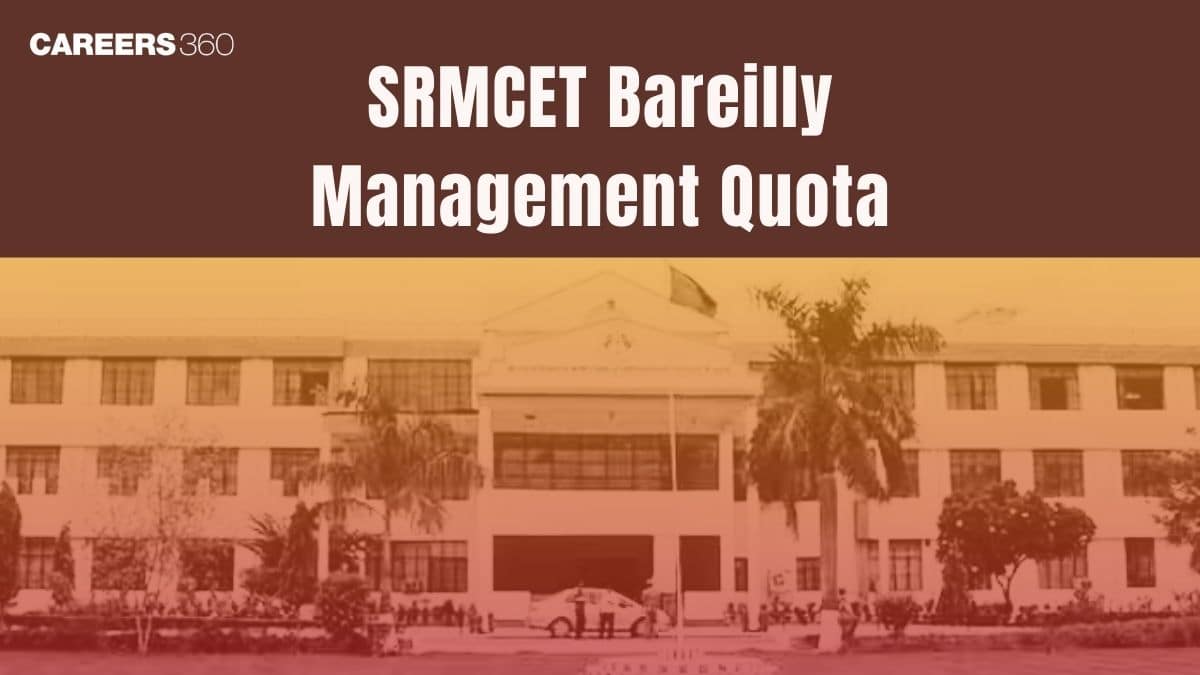Parul University B-TECH Admissions 2026
India's youngest NAAC A++ accredited University | NIRF rank band 151-200 | 2200 Recruiters | 45.98 Lakhs Highest Package
SRMSCET Bareilly Management Quota 2025- Candidates seeking BTech managament quota admission to Shri Ram Murti Smarak College of Engineering and Technology can check this article. There are around five UG engineering programmes offered under SRMSCET Bareilly management quota, as per the last year's data. Basic eligibility criteria include qualifying the JEE Mains and having valid scores in the 10+2 exam BTech admission under the management quota. SRMS College of Engineering Technology, Bareilly, admission will be done as per the UP DTE guidelines. Aspirants must read through the entire article for details about the SRMSCET Bareilly management quota 2025 admission.

This page consists of aspects such as SRMSCET management quota 2025 eligibility, SRMS Engineering College Bareilly fee structure, among other details.
Based on the previous year's data, the institute allocates 15% of BTech admissions to the management quota 2025. The remaining 85% of seats are filled under regular admissions through UPTAC counselling. Given below are the BTech courses available under SRMSCET Bareilly management quota 2025, their fees and total seat intake.
Name | Careers360 Ranking | Course Name | Intake | Management Quota % |
Shri Ram Murti Smarak College of Engineering and Technology, Bareilly | AAA+ | 120 | 15 | |
Electrical And Electronics Engineering | 60 | 15 | ||
60 | 15 | |||
Information Technology | 60 | 15 | ||
Mechanical Engineering | 60 | 15 |
Know more about:
The fee structure for SRMSCET management quota 2025 will be higher than that of normal admissions. The SRMSCET management quota 2025 fees are ₹3.97 Lakhs for all engineering streams which may change. Applicants are advised to contact the college directly for more information.
Course Name | Fees in Rs. |
Computer Science And Engineering | 3,97,128 |
Electrical And Electronics Engineering | 3,97,128 |
Electronics And Communications Engineering | 3,97,128 |
Information Technology | 3,97,128 |
Mechanical Engineering | 3,97,128 |
SRMS College of Technology aspirants can check the SRMSCET management quota 2025 eligibility below.
Also check:
Interested candidates must fill out the application form, which will be made available online. Or, applicants can contact the admissions office for one. Here is the step-by-step process for applying to the SRMSCET management quota 2025.
Complete the application form with the necessary details.
Provide the required certificates.
Pay the application fees and await confirmation.
The admissions office will inform the candidates about their admission status and other details.
Other related links:
SRMS College of Engineering Technology Bareilly was established in 1996. It is managed and run by SRMS trust Bareilly. The college is approved by AICTE. Also, the institute is affiliated with Dr APJ Abdul Kalam Technical University, Lucknow. The official website is srms.ac.in.
Frequently Asked Questions (FAQs)
Candidates must provide their class 12th percentage and JEE Main merit for SRMSCET management quota 2025 admission.
The fees for SRMSCET management quota 2025 BTech must be the same as the regular B.Tech courses, as eor UP DTE rules.
Yes, the SRMSCET provided managmen quota admission.
On Question asked by student community
From your tag, it is evident that you are asking regarding recruiting companies for the College - SRMS College of Engineering,Technology & Research,Bareilly
Let me first share with you certain statistics -
The eligibilty is that you must have been passed class 12th with the subjects Physics, Chemistry & Maths. The college generally take the admissions through UPSEE entrance only but you can contact the admission helpline numbers available on the website and inform them about the JEE MAINS score and the
Hello Shadbeena,
Yes, there is benifit of your category rank. As the results are recently declared the cutoffs are not yet decided, so we will not be able to give you the exact information.By seeing the previous years cutoffs you can get a government or a private college through BCGL
Dear Student,
SRMS as you would be knowing is a very good college.So you dont need to worry about the placements.The college has an average placement rate of 76%. Some of the companies that come are TCS, Infosys, BIL,IBM.
All the best. I hope this was helpful to you.
Among top 100 Universities Globally in the Times Higher Education (THE) Interdisciplinary Science Rankings 2026
Recognized as Institute of Eminence by Govt. of India | NAAC ‘A++’ Grade | Upto 75% Scholarships
Among top 100 Universities Globally in the Times Higher Education (THE) Interdisciplinary Science Rankings 2026
Highest CTC 44.14 LPA | UGC Approved | 1600+ Recruiters | 100% Placement
NAAC A++ Grade | Recognized as Category-1 Deemed to be University by UGC | 41,000 + Alumni Imprints Globally
NAAC A+ Accredited | Among top 2% Universities Globally (QS World University Rankings 2026)